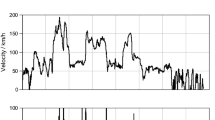Abstract
Research and/or Engineering Questions/Objective The evaluation of vehicle characteristics at an early phase of functional development is a key task in the definition of a viable system and function architecture. Today this is complicated by the fact that full vehicle characteristics, in particular those of modern hybrid and electric vehicles, are dependent on a broad range of electrical, mechanical, thermal and control-related partial aspects. In addition to the current driving status and information on the environment, modern energy management systems (e.g. control systems, range, charging and thermal management) also require predictive information on the driving route to be expected. This includes, for example, uphill road grades, curve radii, speed limits, number of lanes, urban and residential areas, intersections and traffic lights. All together, the intelligent fusion of this information provides for increased safety and energy efficiency. Methodology These additional functions however result in additional complexity in the development process, which must be controlled. Nevertheless many questions already arise in a very early phase of development, in particular in the interaction with the actual utilization profile, such as route, driver and environment characteristics in the various target regions of the future vehicle. This article shows new ways and methods of how the functions and total vehicle characteristics can be evaluated in virtual driving tests in the early phase of development. The method provides a major support for the development and evaluation of energy management systems in the complete vehicle environment with corresponding system interactions: The evaluation of energy states, losses and fuel consumptions in realistic utilization profiles, such as route, driver and environment characteristics in the various target regions of the future vehicle. Results In addition to the evaluation of the individual target functions in a broad range of different scenarios, the correct designs of the individual system components in the complete vehicle can also be verified. The performance and robustness of the operating strategy, as well as the corresponding fuel consumption or CO2 emission values in the range of worldwide conditions of use can also be predicted with the different choice of route and driver types and the amount of traffic typical for the region. Limitations of this study Furthermore, positive fuel consumption effects are identified in the virtual driving test which cannot be recognized due to the insufficient repetitive accuracy in actual traffic. During this, the method can be consistently and uniformly used in the x-in-the-loop development process. As soon as hardware components like the engine, drive train or battery are available, these actual components can already be tested in the virtual driving test in combination with the virtual vehicle in accordance with the principles described. Conclusion As a result, the system and functional architecture can already be comprehensively evaluated in a very early development phase and the degree of integration maturity in the later, actual integration levels can be raised to a considerably higher standard, minimizing time-consuming, expensive development loops.
F2012-E12-027
Access this chapter
Tax calculation will be finalised at checkout
Purchases are for personal use only
Similar content being viewed by others
References
Bernhard Schick, Leonhard V, Klein-Ridder B, IPG Automotive GmbH, Karlsruhe (2008) Holistic inspection of hybrid drivetrains and chassis control systems in a continious Mil/Sil/Hil Process. In: AVEC 2008 Kobe/Japan
Christian Schyr, Thomas Schaden, Stefan Jakubek, Bernhard Schick (2008) New frontloading potentials through coupling of hil-simulation and engine test bed. In: FISITA world congress 2008 Munich
Christian Ress, Dirk Balzer, Alexander Bracht, Sinisa Durekovic, Jan Löwenau on behalf of the ADASIS Forum Adasis protocol for advanced in-vehicle applications
Wilde A, Schneider J, Herzog H-G (2008) Fahrstil- und fahrsituationsabhängige ladestrategie bei hybridfahrzeugen, In: ATZ 110, pp 412–421
Pfister F, AVL List GmbH, Graz; Schick B, IPG Automotive GmbH, Karlsruhe (2011) The future has a sensor. location awareness meets powertrain controls. In: 4th international symposium on development methodology, Wiesbaden
Tetsunori H, Toyota Motor Corporation (2011) Reducing fuel consumption by improved vehicle efficiency. In: ATZ 113(2011) No. 4, pp 274–279
Author information
Authors and Affiliations
Corresponding author
Editor information
Editors and Affiliations
Rights and permissions
Copyright information
© 2013 Springer-Verlag Berlin Heidelberg
About this paper
Cite this paper
Kunz, A., Schick, B., Lange, S. (2013). Predictive Energy Management Strategies in Virtual Driving Tests: Early Evaluation of Networked Controller Functions in Realistic Use Cases. In: Proceedings of the FISITA 2012 World Automotive Congress. Lecture Notes in Electrical Engineering, vol 196. Springer, Berlin, Heidelberg. https://doi.org/10.1007/978-3-642-33738-3_35
Download citation
DOI: https://doi.org/10.1007/978-3-642-33738-3_35
Published:
Publisher Name: Springer, Berlin, Heidelberg
Print ISBN: 978-3-642-33737-6
Online ISBN: 978-3-642-33738-3
eBook Packages: EngineeringEngineering (R0)




